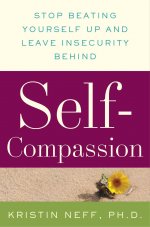 | Self-Compassion: Stop Beating Yourself Up and Leave Insecurity Behind A book by Kristin Neff, PhD Published in 2011 Find in a Library |
BOOK REVIEW: Self-Compassion: Stop Beating Yourself Up and Leave Insecurity Behind
by Brian Thompson, PhD, Scientific Mindfulness blog
I recently finished reading Kristin Neff's new book, Self-Compassion: Stop Beating Yourself Up and Leave Insecurity Behind. As I've mentioned before in Scientific Mindfulness, I've been following Dr. Neff's work on self-compassion for several years now. This new book is the first written for a lay audience.
A researcher at the University of Texas - Austin, Dr. Neff discovered self-compassion when she began attending a local Buddhist center while she was a graduate student at the University of California at Berkley. According to her book, she was really struck by the Buddhist view of compassion and devoted much of her professional career to defining and studying it. In Neff's conceptualization, self-compassion has three components: 1.) being kind to one's self, as opposed to harsh and judgmental; 2.) feeling part of the human condition, as opposed to alone and isolated; 3.) and being mindful of the present moment.
Research on self-compassion has really snowballed of late, and changes in self-compassion are being increasingly studied in mindfulness and acceptance-based research. There's also a growing body of literature suggesting that self-compassion is a more useful construct than that of self-esteem. Despite it's widespread use, our understanding of self-esteem is very problematic, as Dr. Neff discusses in her book.
Dr. Neff's book is an enjoyable mixture of theory, research, and personal anecdotes. It has elements of self-help but is not primarily a self-help book. Each chapter has exercises the reader may use to help develop self-compassion. I bookmarked several of them to use with clients. The exercises become a little weaker in the second half of the book, in my opinion--less specific, more abstract and vague--but I really liked many of them.
Dr. Neff does a great job incorporating research in a very readable and accessible style. Nothing is presented very technically, and the reader can easily find the studies cited in the "Notes" appendix in the back if he or she wants to seek out the original source material. I found myself flipping to the back frequently.
What I found most brave and unique about this book is Dr. Neff's willingness to speak candidly about her own life. In her book, she leads by example and shows a startling openness in sharing her own struggles. From an ex-husband who has never forgiven her for cheating on him to the difficulties of raising a child with autism, Dr. Neff offers incredibly personal anecdotes from her own experience and other people she knows. She doesn't present herself as an expert on self-compassion in the sense that she has it all figured out; rather, she vividly describes her own successes and struggles in incorporating self-compassion into her life.
Overall, I highly recommend the book. For people who'd like to know more about self-compassion and the research behind it, the book is a very up-to-date primer. For those interested in bringing more self-compassion into their lives, the book has a number of exercises and useful illustrations of self-compassion in action. As the book demonstrates and research increasingly shows, there is much to be gained in learning to treat ourselves more kindly.

Last edited:
